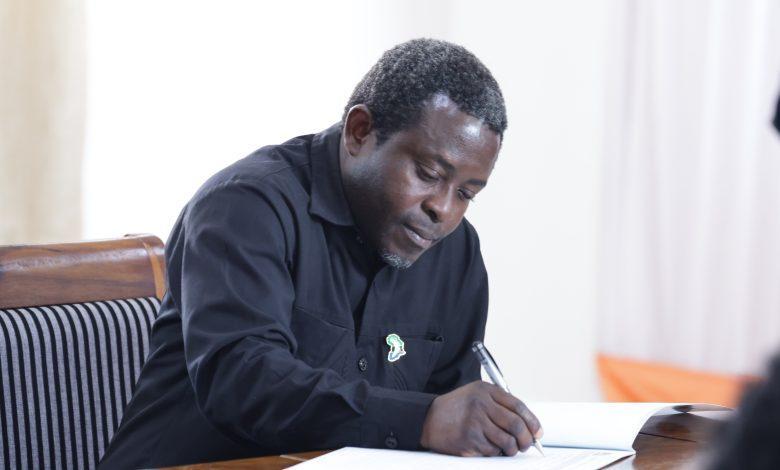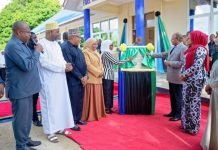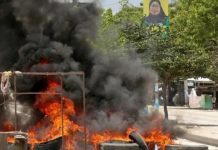Africa-Press – Tanzania. AS the 2025 polls General Election polls draw close on 29th this month, the National Reconstruction Alliance (NRA) presidential candidate, Hassan Almas, is pitching a vision that blends bold reform, economic pragmatism and strong nationalism.
His message is clear and that is Tanzania must rebuild itself by using its own resources efficiently, governing with integrity and putting the nation above politics.
At the heart of the NRA’s Election Manifesto 2025– 2030 is the conviction that effective utilisation of Tanzania’s abundant natural resources can generate enough revenue to finance free education, healthcare and water services.
The manifesto stresses cutting unnecessary expenditure, strengthening governance and ensuring that the wealth of the nation benefits all citizens equally.
Mr Almas outlined the manifesto recently at the University of Dar es Salaam, during a public debate that brought together all presidential contenders.
He used the platform to argue that Tanzania’s future lies not in foreign aid or endless borrowing, but in smart management of its natural endowments from minerals and gas to vast water bodies and fertile land.
“Our goal is to make Tanzania self-reliant by harnessing what we already have,” he said.
“We must stop wasteful spending and channel our resources into essential services that directly improve people’s lives.”
Among the headline proposals in the NRA manifesto is a sweeping plan to halve government expenditure by reducing the number of ministries to just ten.
Each ministry would consist of specialised departments led by technocrats rather than politicians.
According to Mr Almas, this model will enhance professionalism, cut bureaucracy and save billions that can be redirected to priority sectors like education and health.
“Many ministries today are politically driven rather than performance-based. Politicians often think about re-election rather than service delivery,” he remarked.
“We will create a lean, efficient government that works for citizens, not for politics.”
The restructuring, he explained, is designed to promote accountability and eliminate overlapping functions that drain public funds.
His administration, he added, would also introduce a single tax collection system, replacing multiple agencies such as the Tanzania Revenue Authority (TRA) and district councils that often create loopholes for evasion.
“This unified system will simplify revenue collection, reduce corruption and ensure steady funding for national development programmes,” he said.
Perhaps the most transformative pillar of Almas’ vision is his plan to establish a National Development Policy (NDP) a permanent blueprint that outlines Tanzania’s long-term priorities, transcending election cycles and changes in government. In his view, election manifestos are too transient and tied to party interests.
The NDP, he argued, would serve as a non-partisan document that guarantees policy stability and continuity in major infrastructure, education and industrialisation projects.
“Under the NRA, manifestos will become inputs, not the master plan,” he said.
“The National Development Policy will remain the guiding document for all future governments, regardless of which party is in power.”
Such a framework, he said, would protect Tanzania from frequent policy reversals and ensure that each administration builds on the achievements of its predecessor instead of starting afresh.
On innovation and technology, Mr Almas pledged to approve dual citizenship to enable Tanzanians living abroad to participate fully in the country’s economic transformation.
He said the diaspora community rich in skills, capital and global exposure — could play a vital role in modernising Tanzania’s technological landscape, especially through investment in Information and Communication Technology (ICT) and knowledge transfer.
“This will strengthen our human capital and integrate Tanzania into the global digital economy,” he said.
The NRA candidate also placed emphasis on national unity and reconciliation, promising to push for the completion of the new constitution from where the 2014 Draft left off.
His government, he said, will prioritise laws that reflect the will of all Tanzanians, ensuring inclusivity and equality.
He further promised to pardon political prisoners as a gesture of national healing, pledging a new era that embraces the rule of law, freedom of expression, press freedom and political tolerance.
“We must begin a new chapter of reconciliation. Tanzania’s progress depends on peace, respect for differences and the freedom to express divergent opinions,” Almas noted.
In a move likely to spark debate, Mr Almas said the NRA will enforce strict laws against same-sex relations, arguing that moral decay undermines the nation’s social fabric.
He said African leaders have often limited themselves to speeches and condemnations without taking legislative action, allowing harmful practices to persist.
ALSO READ: NRA pledges to remove trade barriers between Zanzibar and Tanzania Mainland
“Society must be guided by values that protect future generations,” he said, framing the issue as one of cultural preservation rather than discrimination. Economically, the NRA aims to propel Tanzania to high-income status by maintaining growth momentum while improving efficiency and innovation.
Mr Almas, aged 41, said his government would build on the achievements of the ruling Chama Cha Mapinduzi (CCM), while injecting new energy into ongoing projects.
He cited the Standard Gauge Railway (SGR), road network expansion and energy infrastructure as examples of transformative undertakings that deserve continuity, but with faster and more accountable execution.
“The ruling party has done a lot, but it has grown tired. While the world is running, they are walking,” he quipped.
“We want to make them run again so Tanzania can rise from a lower-middleincome economy to a highincome one.”
His approach is pragmatic rather than adversarial. Instead of discarding the gains made under CCM, he seeks to build upon them while promoting innovation, fiscal discipline and youth-driven entrepreneurship.
At the core of NRA’s philosophy lies an unapologetic nationalist ideology captured in its slogan: “Utaifa kwanza kabla ya vyama vyetu” (Nation first, before our parties).
For Almas, this mantra signifies an end to divisive politics and a new focus on collective national progress.
He envisions a coalition government that recruits leaders from across the political divide, regardless of party affiliation.
“Why should we exclude capable Tanzanians because of party membership? Under NRA, recruitment will be based on merit, patriotism and competence, not political loyalty,” he said.
By forming an inclusive government, he hopes to reduce political sabotage, promote cohesion, and redirect attention from partisan interests to national priorities.
In his campaign trail speeches, Almas often appeals directly to ordinary Tanzanians namely farmers, workers, students and entrepreneurs, urging them to view the 2025 election as a turning point.
“Our mission is to rebuild this nation from a mindset shaped by division to one rooted in unity and patriotism,” he told supporters during a rally in Kigoma, his home region.
“We want a Tanzania where every citizen feels ownership of the country’s progress.”
The NRA manifesto pledges to eliminate poverty, maintain peace, uphold accountability, strengthen the Union and instill patriotism across all sectors of society.
It positions Almas as a bridge between generations — young enough to understand the aspirations of the youth, yet seasoned enough to navigate Tanzania’s political realities.
For More News And Analysis About Tanzania Follow Africa-Press







